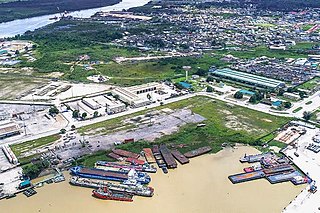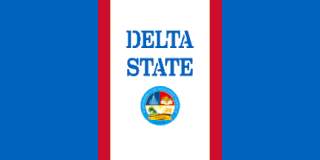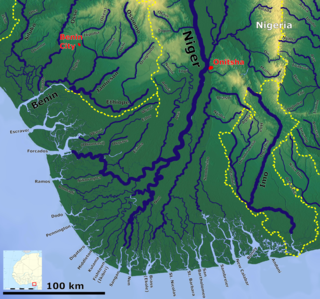
The city of Warri is an oil hub within South-South Nigeria and houses an annex of the Delta State Government House. Warri City is one of the major hubs of the petroleum industry in Nigeria. Warri and her twin city, Uvwie are the commercial capital of Delta State with a population of over 311,970 people in 2006. The city is the indigenous territory of Urhobo, itsekiri and Ijaw people.

Delta State is a state in the South-South geopolitical zone of Nigeria. Named after the Niger Delta—a large part of which is in the state—the state was formed from the former Bendel State on August 27, 1991. Bordered on the north by Edo State, the east by Anambra and Rivers States, and the south by Bayelsa State across the Niger River for 17 km and the Forçados River for 198 km, while to the west is the Bight of Benin which covers about 160 kilometres of the state's coastline. The State was initially created with 12 local government areas in 1991 which was later extended to 19 and now has 25 local government areas. Asaba as its state capital is located along the River Niger on the northeastern end of the State, while the state's economic centre is the twin cities of Warri and Uvwie
Isoko North is one of two Local Government Areas (LGA) in the Isoko region of Delta State, southern Nigeria – the other being Isoko South. The population of Isoko North was approximately 112,000 as of 2003. Its headquarters are in the town of Ozoro which has 14,000 seater capacity Olympic size stadium at the Delta State Polytechnic Ozoro, now upgraded to a University. There are 13 Electoral Wards in the Local Government Area. Major towns in Isoko North are Ozoro, Owhelogbo, Otor Owhe, Oghara-Iyede and Emevor. The people are mostly Christian and traditional worshippers. Isoko North contains oil producing regions, and is the location of some of the recent conflict in the Niger Delta.

The Forçados River is a channel in the Niger Delta, in southern Nigeria. It flows for approximately 198 kilometres (123 mi) and meets the sea at the Bight of Benin in Delta State. It is an important channel for small ships. The Forçados River splits from the Niger River at Toru-Abubou near Agbere Town in Sagbama Local Government Area of Bayelsa State, the same point as the Nun River.

The Niger Delta is the delta of the Niger River sitting directly on the Gulf of Guinea on the Atlantic Ocean in Nigeria. It is located within nine coastal southern Nigerian states, which include: all six states from the South South geopolitical zone, one state (Ondo) from South West geopolitical zone and two states from South East geopolitical zone.

Ughelli is a city in Delta State, Nigeria, and one of the 24 kingdoms that make up the Urhobo Nation. It also serves as the headquarters of Ughelli North local government area of Delta State. The city is indigenous to the Urhobo ethnic nationals, but there is a mixture of several other tribes from the country & abroad. It is an industrial and agricultural spot of Delta State.

Nigeria is the second largest oil and gas producer in Africa. Crude oil from the Niger Delta basin comes in two types: light, and comparatively heavy – the lighter has around 36 gravity while the heavier has 20–25 gravity. Both types are paraffinic and low in sulfur. Nigeria's economy and budget have been largely supported from income and revenues generated from the petroleum industry since 1960. Statistics as at February 2021 shows that the Nigerian oil sector contributes to about 9% of the entire GDP of the nation. Nigeria is the second largest oil and gas producer in Africa, a major exporter of crude oil and petroleum products to the United States of America. In 2010, Nigeria exported over one million barrels per day to the United States, representing 9% of the U.S. total crude oil and petroleum products imports and over 40% of Nigeria exports.

The Movement for the Emancipation of the Niger Delta (MEND) is a decentralised militant group in the Niger Delta region of Nigeria. MEND's actions – including sabotage, theft, property destruction, guerrilla warfare, and kidnapping – are part of the broader conflict in the Niger Delta and reduced Nigeria's oil production by 33% between 2006-07.

The current conflict in the Niger Delta first arose in the early 1990s over tensions between foreign oil corporations and a number of the Niger Delta's minority ethnic groups who feel they are being exploited, particularly the Ogoni and the Ijaw. Ethnic and political unrest continued throughout the 1990s despite the return to democracy and the election of the Obasanjo government in 1999. Struggle for oil wealth and environmental harm over its impacts has fueled violence between ethnic groups, causing the militarization of nearly the entire region by ethnic militia groups, Nigerian military and police forces, notably the Nigerian Mobile Police. The violence has contributed to Nigeria's ongoing energy supply crisis by discouraging foreign investment in new power generation plants in the region.
Environmental issues in the Niger Delta are caused by its petroleum industry. The delta covers 20,000 km2 (7,700 sq mi) within wetlands of 70,000 km2 (27,000 sq mi) formed primarily by sediment deposition. Home to 20 million people and 40 different ethnic groups, this floodplain makes up 7.5% of Nigeria's total land mass. It is the largest wetland and maintains the third-largest drainage basin in Africa. The Delta's environment can be broken down into four ecological zones: coastal barrier islands, mangrove swamp forests, freshwater swamps, and lowland rainforests. Fishing and farming are the main sources of livelihoods for majority of her residents.
Ozoro is a city and the headquarter of Isoko North Local Government area of Delta State, Nigeria. It is one of the two administrative units in the Isoko region of [Delta State, southern Nigeria. Ozoro had been incorrectly spelt Usoro in some older maps of Nigeria. Ozoro, the capital city of Isoko North, has a population of approximately 186,000 inhabitants.

Uvwie (/hu-we-ɛ/), is a principal Urban Local Government Area in Delta State. It lies along the Warri River and it is one of the twenty-four Urhobo Kingdoms. The entirety of the LGA is conurbated with the city of Warri, making it a greater part of Warri metropolitan area
The Warri Crisis was a series of conflicts in Delta State, Nigeria between 1997 and 2003 between the Itsekiri, the Ijaw, and the Urhobo ethnic groups. Over 200,000 people were displaced by the Warri conflict between 1999 and 2006. Over 700,000 people were displaced during this period by violence in Delta State overall.
Ughelli South is a Local Government Area of Delta State, Nigeria. It is made up of six Urhobo kingdoms namely: Ughievwen, Arhavwarien, Effurun Otor, Eghwu, Okparabe and Olomu. Otu Jeremi is the headquarters of Ughelli South LGA. It is the fourth most populated local government in Delta State.
The Urhobos are people located in southern Nigeria, near the northwestern Niger Delta.
Nembe Creek Trunk Line (NCTL) is a 97 kilometre, 150,000 barrels of oil per day pipeline constructed by Royal Dutch Shell plc and situated in the Niger Delta region of Nigeria. "The Trunk Line is one of Nigeria's major oil transportation arteries that evacuate crude from the Niger Delta to the Atlantic coast for export." It is owned by Aiteo Group, which recently purchased it as part of the related facilities of the prolific oil bloc OML29 from Shell Petroleum Development Company, SPDC. By March 2015, the Shell Petroleum Development Company of Nigeria Limited (SPDC), a subsidiary of Royal Dutch Shell plc (Shell), completed the assignment of its interest in OML29 and the Nembe Creek Trunk Line to Aiteo Eastern E&P Company Limited, a subsidiary of Aiteo Group. The other joint venture partners, Total E&P Nigeria Limited and Nigerian Agip Oil Company Limited also assigned their interests of 10% and 5% respectively in the lease, ultimately giving Aiteo Eastern E&P Company Limited a 45% interest in OML29 and the Nembe Creek Trunk Line.
The Niger Delta Avengers (NDA) is a militant group in the Niger Delta region of Nigeria. The group publicly announced their existence in March 2016.
The 2016 Niger Delta conflict is an ongoing conflict around the Niger Delta region of Nigeria in a bid for the secession of the region, which was a part of the breakaway state of Biafra. It follows on-and-off conflict in the Christian-dominated southern Niger Delta in the preceding years, as well as an insurgency in the Muslim-dominated northeast.
Owhrode is a community in the Udu Local Government Area of Delta State, Nigeria.
Oil theft in Nigeria is considered to be the illegal appropriation of crude or refined oil products from the pipelines of multinational oil companies. Oil theft in Nigeria is facilitated by the pragmatic co-operation between security forces, militia organizations, the local population, and oil company employees who use a variety of methods to steal oil from the multinational oil corporations that are stationed within the country. Currently, Exxon Mobil, Chevron, Equinor, Shell, and Agip are the five largest multinational oil companies present in Nigeria. Due to the lack of federal oversight and a large network of corruption, oil theft is primarily cellular rather than hierarchical and requires frequent collaboration between a variety of random players depending on the level of oil theft being committed. Each group maintains a specific role in the oil theft trade in Nigeria. These key players use methods such as hot-tapping and cold-tapping to perform oil bunkering and steal thousands of barrels of oil per day from established oil pipelines. In addition to stealing oil from the pipelines, oil theft can also occur during the transportation of the crude oil product to the oil shipping terminals for export.






